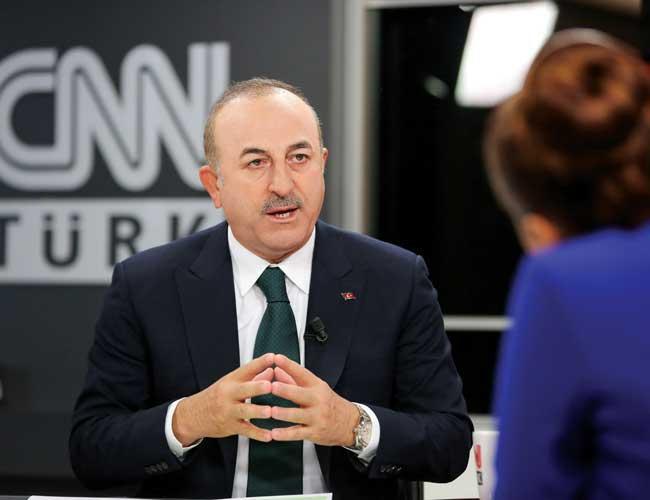
Explanations from both the U.S. State Department and the Pentagon have failed to ease Ankara’s concerns over Washington’s plans to build a Kurdish militia force across from Turkey’s border, with Foreign Minister Mevlüt Çavuşoğlu stressing on Jan. 18 that Turkey is determined to hit Afrin in the neighboring country.
Turkey was not satisfied by Secretary of State Rex Tillerson’s remarks that the U.S. had no intention to build a Syria-Turkey border force, after the latter said the issue had been “misportrayed and misdescribed.”
“The formation of a terrorist army along our border with Syria would cause irreversible damage to our ties with the U.S.,” Çavuşoğlu said during an interview on private broadcaster CNN Türk with daily Hürriyet’s Ankara correspondent Hande Fırat.
Responding to a question on whether a planned operation on Syria’s Afrin held by the People’s Protection Units (YPG) was delayed after the U.S. statements, Çavuşoğlu said “no” and vowed that “we will intervene in Afrin.”
He did not specify the date of the possible Afrin operation but noted that the Turkish military said it is “ready to start anytime.”
“Turkey is subject to attacks every day from Afrin. It is our right to self-defense in line with international law to take measures against a terror group surrounding us on three sides, violating our rights,” Çavuşoğlu said.
Ankara considers the YPG a terrorist group for its links to the outlawed Kurdistan Workers’ Party (PKK).
High level of security
The Turkish Armed Forces (TSK) ordered on Jan. 18 for its troops on the Syrian border to increase security measures to a “high level.”
Following a National Security Council (MGK) meeting, headed by President Recep Tayyip Erdoğan on Jan. 17, the official statement released said Turkey would take “serious precautions” on its borders.
The military retaliated to attacks made by the Kurdish militia in northern Syria in the early morning, state-run Anadolu Agency reported on Jan. 18, citing sources on the ground.
Late on Jan. 17 Tillerson had denied that the U.S. had any intention of building a Syria-Turkey “border force.”
“Some people misspoke. We are not creating a border security force at all,” Tillerson told reporters on board an aircraft taking him back to Washington from Vancouver, where he had attended a meeting on North Korea.
“I think it’s unfortunate that comments made by some left that impression. That is not what we’re doing,” he added adding that the U.S. “owes Turkey an explanation.”
The statement came after the top U.S. diplomat met Çavuşoğlu on the sidelines of the Vancouver meeting.
There are controversial statements coming from the U.S., said
Prime Minister Binali Yıldırım on Jan. 18 also blasted “contradictory” statements from the U.S.
“Over the last three days U.S. officials have made statements that refute one another. One day it was said that a new border force had been set up, another day they said they are setting up a unit with local forces in order to maintain security in the region after eliminating DAESH in the region,” Yıldırım said at an event in Ankara.
President Erdoğan has repeatedly warned of an imminent incursion in Afrin after Washington said it would help the Syrian Democratic Forces (SDF), led by the YPG militia, set up a new 30,000-strong border force.
“On counterterrorism, we will continue to work with our allies and partners such as Turkey to address the terror threat in Idlib and address Turkey’s concerns with PKK terrorists elsewhere,” Tillerson said in a speech at Stanford University.
The Pentagon said in an earlier statement it was training “internally focused” Syrian fighters with a goal of preventing an Islamic State of Iraq and the Levant (ISIL) resurgence and ensuring Syrians displaced by the war could return to their communities.
“Turkey’s security concerns are legitimate,” it added.
Pentagon: No new army
The Pentagon said the SDF force is not a new “army” or conventional “border guard” force.
“The U.S. continues to train local security forces in Syria. The training is designed to enhance security for displaced persons returning to their devastated communities,” Pentagon spokesman Eric Pahon said in a written statement to state-run Anadolu Agency.
“It is also essential so that ISIS cannot reemerge in liberated and ungoverned areas. This is not a new ‘army’ or conventional ‘border guard’ force,” he said, using another acronym for ISIL.
The spokesman for the U.S.-led coalition against ISIL, Ryan Dillon, had said on Jan. 14 that the coalition will establish a 30,000-strong new border security force with the SDF in Syria.
Turkey’s Presidential Spokesperson İbrahim Kalın, meanwhile, said on June 18 that steps by Turkey “for protecting its own national security in Afrin, Manbij, Jarabulus or in other places [in Syria] are definitely not a move against Syrian Kurds.”